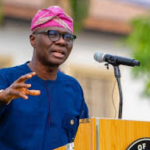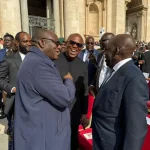...To get all news updates, Join our WhatsApp Group (Click Here)
Also Join our WhatsApp Channel (Click Here)
At a time when Europe’s relationship with Africa is high on foreign policy and developmental agendas and with the European Union beginning to deliver on its 2017 External Investment Plan, targeted at attracting investment and job creation in Africa, the Tony Elumelu Foundation brought together leading stakeholders in the development finance sector, at a case study session in the EU capital, Belgium. The convening demonstrated that Africa also had solutions to bring to the table and platformed the Foundation’s unique approach to catalysing entrepreneurship in scale across the continent.
Themed “A Convening on Africa’s Economic Transformation: A Case Study of the Tony Elumelu Foundation”, the event presented the results of the first five years of the Foundation’s Entrepreneurship Programme a unique programme, which has trained, mentored and seeded 4,470 African entrepreneurs with 3,050 newly announced to receive seed funding, and drawn over 200,000 applications to its 2019 cycle. Tony Elumelu’s $100m investment in entrepreneurial philanthropy was held up as an example of how vital capital could be targeted efficiently and effectively, at African businesses best able to create significant economic and developmental impact.
Opening the event, Mr. Koen Doens, Deputy Director General, DEVCO, EU, said: “Africa needs to create jobs by the millions to match the needs of its exponentially growing population. It will achieve this only if it unleashes a generation of empowered entrepreneurs. The Tony Elumelu Foundation contributes to this massively. The European Union wants to play its part and contribute to this endeavour.”
During an indepth question and answer session with EU-Africa relations expert, Annie Mutamba, Founder, Mr. Tony O. Elumelu CON, highlighted the growing interest in the Tony Elumelu Foundation and its unique approach, while welcoming a new type of intervention in Africa. “We very much believe in collaboration, mutual respect and a shared commitment to transform Africa. Africa is ready but we need to do this through the right sustainable manner, that enables our people to become self-reliant, and independent, instead of perpetuating dependency. We need to implement practical solutions on ground through entrepreneurship, which empower people economically and addresses issues of extremism, migration, and insecurity.”
Minister Phillippe De Backer, Minister for Digital Agenda, Telecommunications and Post, Belgium, also commented: “There is an increasing desire in Europe to engage Africa, including its grassroots in a structure and targeted approach with the right processes. The Tony Elumelu Foundation offers this platform.”
The Tony Elumelu Foundation, which last month in March announced 3,050 selected entrepreneurs for its 2019 cycle, continues to grow in scale, ambition and impact, and now actively leverages technology to support entrepreneurs through TEF Connect – a digital hub designed to link entrepreneurs across Africa, and which already has 500,000 users.
On the Foundation’s future plans, he stated: “We want to make sure that we impact more, reach more, touch more lives and get more women involved. We want to see more Northern Africa participation. We would like to reach 10,000 a year, with support from partners to empower additional entrepreneurs. We want to eradicate poverty and create wealth in a sustainable way. Ultimately, \we want a larger and broader entrepreneurship ecosystem, that supports young Africans, and we want to deepen our engagement with government to create the enabling environment to support these Africans to succeed – the right investment climate, training, education, access to capital and most importantly creating the right investment culture.”
Other dignitaries at the event included: Carl Michiels, Director, European Centre for Development Policy Management (ECDPM); Bruno Wenn, Former CEO/Chairman at DEG-German Investment and Development Company, and Advisory Board Member, Tony Elumelu Foundation; Mr Viwanou Gnanssougou, Assistant Secretary General, African, Caribbean and Pacific (ACP) at the European Council of the European Union, and Ifeyinwa Ugochukwu, CEO of the Tony Elumelu Foundation.
You can get every of our news as soon as they drop on WhatsApp ...To get all news updates, Join our WhatsApp Group (Click Here)
Also Join our WhatsApp Channel (Click Here)
















